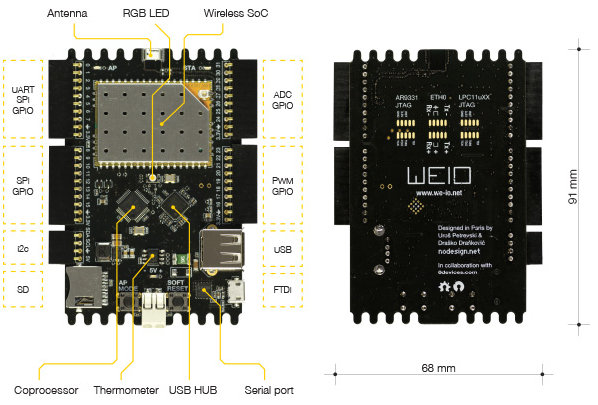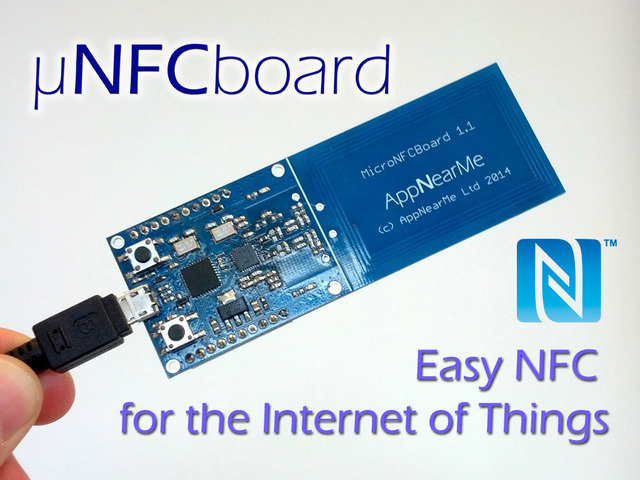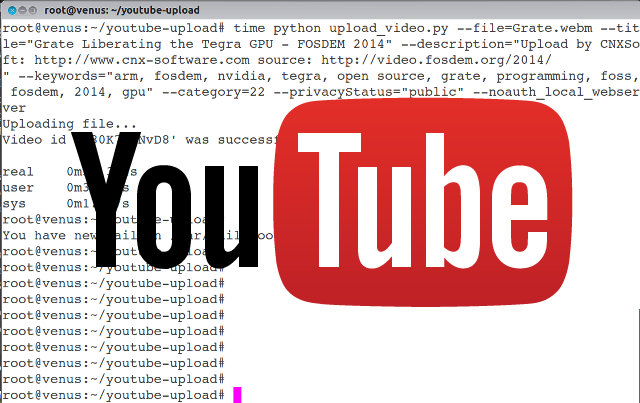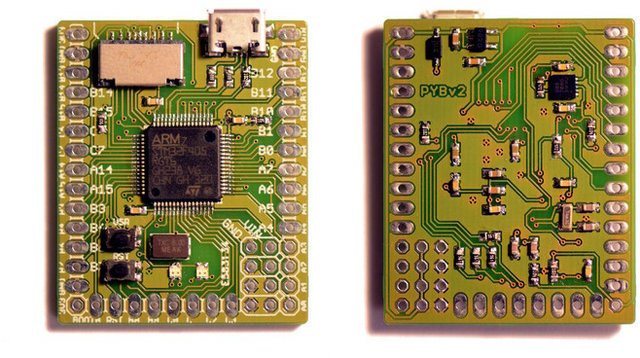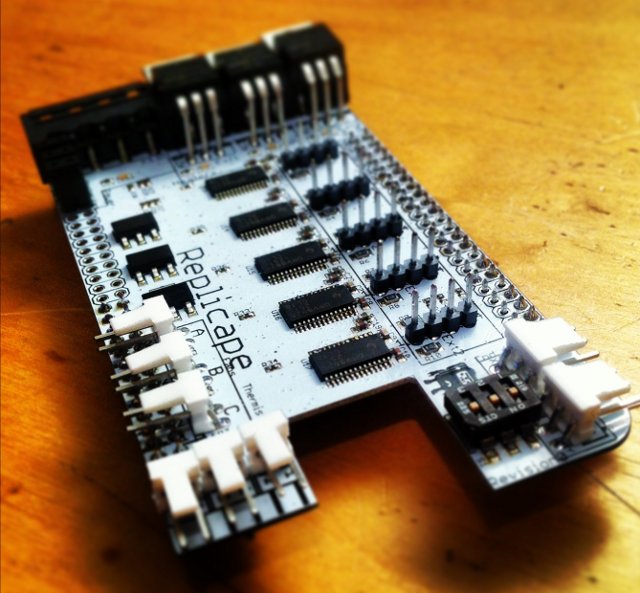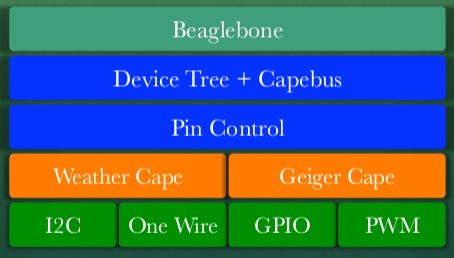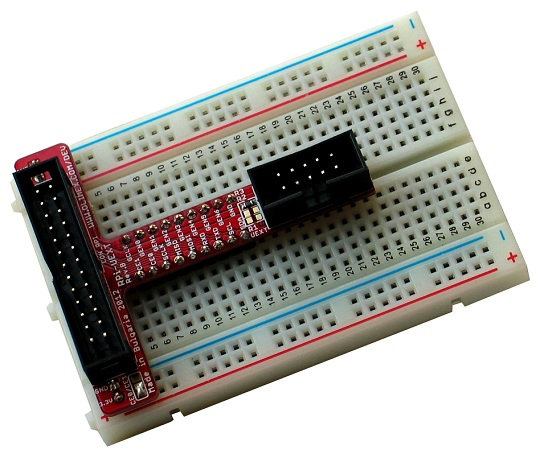WeIO is an open source hardware board for the Internet of things with Wi-Fi connectivity and lots of I/Os designed by nodesign, a French based startup, in collaboration of 8devices, the makers of the Carambola boards. WeIO is powered by an Atheros AR9331 SoC running OpenWRT as well as an NXP LPC MCU for faster handling of I/Os and support for analog I/Os. One interesting aspect of this board is that it can be programmed via a web browser using HTML5 or Python, and it does not rely on the Cloud to store data. WeIO hardware specifications: SoC – Atheros AR9331 MIPS 24K Wireless SoC @ 400 MHz MCU – NXP LPC11xx ARM Cortex M0 MCU for analog I/O and real-time H/W interfaces System Memory – 64 MB DDR2 Storage – 16 MB flash + micro SD slot Connectivity – 802.11 b/g/n Wi-Fi with on-board antenna (AP and STA modes), […]
$70 MicroNFCBoard Brings NFC Connectivity to Any Board or Device (Crowdfunding)
AppNearMe MicroNFCBoard is a development platform for Near Field Communication (NFC) comprised of an NFC transceiver, an NXP MCU, and all software stack and tools you need for development. This board also exposes various I/Os that allows you to connect to external hardware or devices, and it can be used with an Arduino, Raspberry Pi, mbed or PC/Mac. Let’s go through the board specifications first: MCU – NXP LPC11U34FHN33/421 Cortex M0 MCU @ 48MHz, with 10KB RAM, 48KB FLASH, 4KB EEPROM NFC Transceiver – NXP PN512. Reader/Writer and card operation modes supporting ISO14443A/Mifare and FeliCa schemes. NFCIP-1 mode Splittable antenna USB – 1x micro USB port for power and programming I/O – 20x through holes with access to serial (UART), I2C, SPI, 4x ADC inputs, IRQ, Boot and Reset, and power pins. (2x pin header that you can solder are provided) Misc – Reset and bootloader enable push-buttons, 2x LEDs. […]
How to Upload YouTube Videos with the Command Line in Linux
Like many people, I access Internet via an ADSL connection at home. ADSL stands for “Asymmetric Digital Subscriber Line”, with Asymmetric being the key word here, as it just mean your download speed will be (much) higher than your upload speed. My ISP promises a theoretical 10 Mbps download speed, and 512 Kbps upload speed, and this is pretty close in reality: Data Rate: 10240 (downstream), 509 (upstream) kbps. Assuming a 265MB video, in the very best case (63 KB/s), it would take 1 hour and 12 minutes to upload a video to YouTube, but in practice it’s often closer to 2 or 3 hours. If it’s a video you’ve shot yourself, and copied inside your computer, there’s very little you can do, except processing the video with tools such as HandBrake to make it smaller before upload. But if the video files are located somewhere in the Internet, and […]
Micro Python Brings Python to MCU Boards and Robots (Crowdfunding)
Micro Python is an implementation of the Python programming language, written from scratch and optimized to run on micro-controllers such as the ones based on ARM Cortex-M cores. Damien George, the developer, also designed the Micro Python board powered by STMicro STM32F405 Cortex M4 MCU for the purpose of running Micro Python. Even though in this project, the star of the show is not the board itself, as Micro Python will run on other platform once it’s open source, let’s have a look at the hardware specifications: MCU – STMicro STM32F405RG @ 168MHz with 1MB flash, 192KB RAM, and an FPU. External storage – Micro SD slot 30 general purpose I/O pins – 5 USARTs, 2SPIs, 2 I2C busses, 14 ADC pins, 2 DAC pins, 2CANs, and 4 servo ports with power. Built-in USB interface Misc – 4 LEDs, a user switch, a reset switch, a real-time clock, and a 3-axis […]
You-Get – Video Download Script for YouTube, YouKu, DailyMotion, and More
YouKu is the equivalent of YouTube in China, and earlier today I wanted to download a video from the service, so I’ve looked for an application or script that can do the job in Linux. I’ve finally come across you-get, a python 3 script that claims to be able to download videos from an impressive number of websites, namely: YouTube Vimeo Coursera Blip Dailymotion Facebook Google+ Google Drive Tumblr Vine SoundCloud Mixcloud Freesound JPopsuki VID48 Niconico (ニコニコ動画) Youku (优酷) Tudou (土豆) YinYueTai (音悦台) AcFun bilibili CNTV (中国网络电视台) Douban (豆瓣) ifeng (凤凰视频) iQIYI (爱奇艺) Joy.cn (激动网) Ku6 (酷6网) MioMio h NetEase (网易视频) (v.163.com) PPTV.com QQ (腾讯视频) (v.qq.com) Sina (新浪视频) (video.sina.com.cn) Sohu (搜狐视频) (tv.sohu.com) 56 (56网) Xiami (虾米) Baidu (百度音乐) (music.baidu.com) SongTaste I won’t try all, but just test it with YouKu and YouTube. First things first, let’s install it:
|
1 2 3 4 5 |
git clone git://github.com/soimort/you-get.git cd you-get sudo apt-get install python3 python3-setuptools ./you-get -V make install |
Time to go to youku.com and download a video:
|
1 2 3 4 5 6 7 8 |
you-get http://v.youku.com/v_show/id_XNTQ1OTk3NTAw.html Video Site: Youku.com Title: 1 second boot QT app in linux-sunxi with A10 Type: Flash video (video/x-flv) Size: 5.45 MB (5711001 Bytes) Downloading 1 second boot QT app in linux-sunxi with A10.flv ... 100.0% ( 5.4/5.4 MB) [========================================] 1/1 |
Success! […]
Replicate CAPE Adds 3D Printring Capability to the Beaglebone
Beagleboard.org launched the Beaglebone Cape Design Contest back in November, several designs were submitted, and yesterday, they announced the 3 winning CAPEs who will be manufactured and sold by Circuitco Electronics: Replicape by Elias Bakken – 3D printer cape Interacto by Chris Clark – Cape with a triple axis accelerometer,a gyroscope, a magnetometer and a 640×480 30fps camera. Geiger cape by Matt Ranostay – Geiger counter cape Since today I’ve started to write about 3D printing, let’s carry on and have a closer look at the Replicape. The Replicape 3D printer cape includes: 5 stepper motors (X, Y, Z, Ext1, Ext2) 3 high power MOSFETs (PWM controlled) for 2 extruders and 1 HPB 3 medium power MOSFETs (PWM controlled) for up to 3 fans 3 analog input ports for thermistors 3 inputs for end stops (X, Y, Z) Programmable current limits on steppers motor drivers (SMD). No need to manually adjust […]
Beaglebone: The Perfect Telemetry Platform? – ELCE 2012
Matt Ranostay, technical staff at Ranostay Industries, gives a presentation about a telemetry system based on Beaglebone at the Embedded Linux Conference Europe on November 5, 2012. Abstract: The author will discuss his ongoing and other team members efforts to develop hardware and software that reports sensor data to the community. This talk will be split into several parts a) types of useful sensors b) hardware design of Beaglebone capes c) and telemetry reports to Pachube/Cosm. Demonstrating that in the new world of cheap prototyping boards with I2C, GPIO, and SPI that anyone can setup a decent monitoring system for home security, automation, and weather reporting. There will be a live demo of prototype geiger counter + weather station. The audience targeted is the professional hobbyist who likes to hack on microcontrollers in their spare time. It will take little to medium knowledge of electrical engineering to follow this talk. […]
3.95 Euros RPI-UEXT Breadboard & UEXT Adapter for Raspberry Pi is Now Available
Last month, I wrote about an upcoming T-shaped adapter for the Raspberry Pi that can easily plug into a breadboard, and provides a UEXT connector that can bring new features (RTC, GPRS, sensors, relays…) to the Raspberry Pi via low cost external UEXT modules. Olimex has just announced the RPI-UEXT adapter is now available for 3.95 Euros. To connect RPI-UEXT adapter to the Raspberry Pi, you’ll need to purchase a 26-pin ribbon cable and a breadboard if you don’t have these already. Olimex provides those 2 for respectively 2 & 2.95 Euros. That means a complete set would cost 8.90 Euros. As discussed on my first RPI-UEXT post, what makes this little board really interesting are all the existing UEXT modules (over 20) that bring new features at very low cost. Olimex uploaded a video showing the Raspberry Pi, the RPI-UEXT and the MOD-IO UEXT module connected together, with the Raspberry […]


